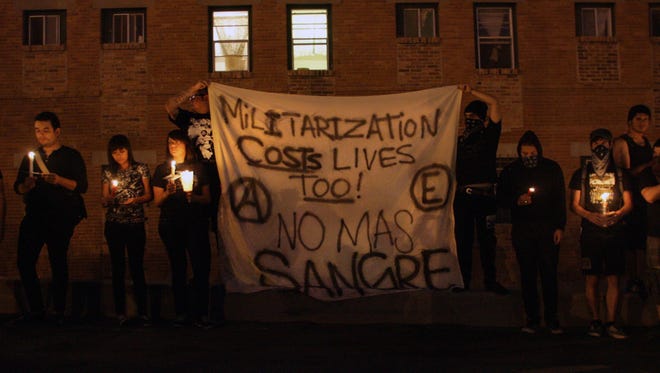Supreme Court enters Mexico border debate with Texas shooting case
WASHINGTON — As if U.S.-Mexico relations could get no worse, the Supreme Court enters the fray Tuesday with a case that may set them back further.

Either the justices will decide, as two lower federal courts before them, that 15-year-old Sergio Adrián Hernández Güereca was killed by a U.S. Border Patrol agent without any possible legal recourse for his distraught parents — or that Jesus Mesa, the agent, can be sued for damages for violating the boy's constitutional rights.
The oral argument will focus specifically on an area near to one of President Trump's top priorities — the border where his promised wall would rise. But in this case, the dry bed of the Rio Grande and a barbed-wire fence provide the backdrop for a heartbreaking saga that has dragged on nearly seven years — all because the shooter and the victim were on opposite sides of the border.
It was a typical summer day in 2010 when Hernández died. His lawyers say he was playing with three friends in the 33 foot-wide concrete culvert separating El Paso and Ciudad Juárez, Mexico. Mesa's lawyers say he responded to a group of suspected illegal aliens throwing rocks at Border Patrol agents. Cellphone videos appeared to show that Hernández was hiding beneath a train trestle when he was shot in the head.
Those facts matter little to the Supreme Court. Its task is to determine whether the boy's parents have any right to bring Mesa into a courtroom at all — or whether, in the words of Hernández's lawyers, the boy was in "a legal no-man’s land in which federal agents can kill innocent civilians with impunity."
Lower courts have said it's the latter. Because Hernández was a Mexican citizen in Mexico, they ruled that he lacked constitutional protection against unreasonable use of deadly force under the 4th Amendment, as well as due process rights under the 5th Amendment. And while a Mexican court could have tried Mesa there, the U.S. government refused extradition.
What's more, the courts ruled that even if the boy was constitutionally protected, Mesa was entitled to qualified immunity because he was unaware his actions might violate Hernández's rights.
“If this had happened a few feet away and this 15-year-old had been on this side of the border, he would have a constitutional tort suit, no questions asked,” says Andrew Kent, a professor at Fordham University School of Law.

The Catch-22 set of circumstances isn't unusual along the border. A 2013 investigation by the Arizona Republic found that Border Patrol agents and Customs and Border Protection officers killed at least 42 people — including at least 13 Americans — in an eight-year period. At the time, none of the agents or officers responsible were publicly known to have faced consequences.
While the government has steadfastly stood behind Mesa throughout the court proceedings, some former officials have taken the family's side. James Tomsheck, former assistant commissioner of Customs and Border Protection's Office of Internal Affairs, said in court papers that an increasingly militarized Border Patrol and inadequate field training "have led to an environment in which Border Patrol agents have unnecessarily employed lethal force on the U.S.-Mexico border."
The Mexican government noted in court papers that many of its residents "spend much of their day within shooting distance" of Border Patrol agents. If the situation were reversed, it said, the United States would expect Mexican agents to be held responsible. “There is no bright line at the border beyond which all constitutional rights cease,” it argued.
To back up its claim, the Mexican government cited a 2008 Supreme Court case which granted detainees at Guantánamo Bay, Cuba, the right to sue federal agents. But the Justice Department argued in response that the detention facility was under U.S. control, while Hernández was inside Mexico.
With an eye toward the troubled relationship between the neighboring countries, the Trump administration — taking over the case from the Obama administration — asserts "the need for caution before inserting the courts into such sensitive matters of international diplomacy." If Mesa is liable for a death on foreign soil, it says, non-citizens around the world could assert constitutional rights.
Lawyers for the boy's family say a ruling in their favor would have a positive effect. "Foreign relations with Mexico would be improved, not hurt, by extraterritorial application," they wrote. But "if this court were to side with the government, it would effectively turn the border into an on/off switch for fundamental constitutional protection."
Read more:
Supreme Court: Can Mexican citizens sue Border Patrol agents in cross-border killings?